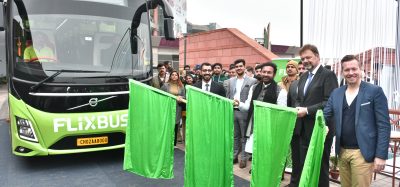Nine tech start-ups chosen to pilot transport solutions in New York
- Like
- Digg
- Del
- Tumblr
- VKontakte
- Buffer
- Love This
- Odnoklassniki
- Meneame
- Blogger
- Amazon
- Yahoo Mail
- Gmail
- AOL
- Newsvine
- HackerNews
- Evernote
- MySpace
- Mail.ru
- Viadeo
- Line
- Comments
- Yummly
- SMS
- Viber
- Telegram
- Subscribe
- Skype
- Facebook Messenger
- Kakao
- LiveJournal
- Yammer
- Edgar
- Fintel
- Mix
- Instapaper
- Copy Link
Posted: 27 February 2020 | Sam Mehmet (Intelligent Transport)
During the eight-week programme, each start-up will collaborate closely with participating agencies and work to demonstrate that their product has the potential to solve one of the identified transport challenges.


The Partnership for New York City’s Transit Tech Lab, the Metropolitan Transportation Authority (MTA) and four other transportation agencies have announced that nine start-up companies have been selected to pilot cutting-edge technologies that could improve accessibility, revenue generation, and traffic congestion for travellers in the New York metropolitan area.
The agencies joining the MTA in this initiative are the Port Authority of New York and New Jersey, New York City Department of Transportation, NJ TRANSIT and Amtrak.
The Transit Tech Lab is part of the public-private Transit Innovation Partnership and enables the MTA and other public transportation agencies to leverage innovative technology solutions to improve metropolitan area transit, with the aim to make New York the global leader in public transportation.
“We are thrilled by the response to the 2020 Transit Tech Lab challenges in accessibility, curb coordination and revenue generation and look forward to the value these innovations will bring to customers. It is a testament to the MTA’s leadership and the tech sector’s dedication that this year nearly all of the region’s largest transit agencies have signed on as partners,” said Rachel Haot, Executive Director of the Transit Innovation Partnership.
“The Transit Tech Lab has been a great partner to the MTA, fostering innovative ideas and creative pilots for improving our operations and the customer experience. As we work hard to modernise the MTA, we’re excited for what this round of challenges will bring and thrilled that the Lab has expanded to include our regional partners in transportation,” said Patrick J. Foye, Chairman and CEO of the MTA.
More than 130 companies applied to be part of this year’s programme, which focuses on three topics that were jointly chosen by the participating agencies:
- Accessibility: How can we make New York’s public transit systems more accessible?
- Entrepreneurial Revenue Generation: How can public transit generate more revenue outside the farebox?
- Curb Coordination: How can transit agencies reduce traffic by increasing coordination at the curb?
Companies that successfully achieve a “proof of concept” accelerator phase will move on to a formal pilot project that deploys their technology for testing in one or more participating transit systems. Last year, six companies were selected for the accelerator programme and four proceeded to pilots upon completion.
The nine start-ups for 2020 are:
- Acoustic Protocol: Converts audio public address announcements into personalised, targeted messages to improve accessibility for deaf and hard of hearing customers
- NaviLens: Uses a computer vision algorithm that interprets geospatial information and provides navigation guidance in any space without use of GPS, Bluetooth, WiFi or cell coverage
- Knaq: Provides predictive elevator and escalator maintenance tools enabling any service elevator to be digitised and its status instantly updated online
- Allvision IO: Inventories curb infrastructure and monitors street parking behaviour of both commercial and non-commercial vehicles
- CARMERA: Provides up-to-the-minute construction data and descriptions, such as obstructions in parking spots or traffic lanes
- CurbFlow: Marketplace for curbside access that sources dedicated curb supply from municipalities to create pickup and drop-off management and maps
- Numina: Measures curb-level behaviours using a proprietary, camera-based sensor that mounts to any fixed infrastructure. Numina processes all imagery securely onboard the sensor, anonymously measures activity and provides behavioural insights to improve traffic operations
- Miles: Provides anonymised multimodal analytics to cities and offers mileage-based rewards to users encouraging public transit use
- Okeenea: Smartphone app that provides transit system navigation for customers who are blind/low vision or deaf/hard of hearing.
Related topics
Infrastructure & Urban Planning, Intelligent Transport Systems (ITS), Public Transport, Traffic Management, Travel & Passenger Information, Vehicle & Passenger Safety
Related cities
New York
Related organisations
Amtrak, New York City Department of Transportation, NJ TRANSIT, Port Authority of New York and New Jersey, The Metropolitan Transportation Authority (MTA), The Partnership for New York City
Related people
Patrick J. Foye, Rachel Haot








